
Laura Honda-Hasegawa
@laurahhBorn in São Paulo, Brazil in 1947. Worked in the field of education until 2009. Since then, she has dedicated herself exclusively to literature, writing essays, short stories and novels, all from a Nikkei point of view.
She grew up listening to Japanese children's stories told by her mother. As a teenager, she read the monthly issue of Shojo Kurabu, a youth magazine for girls imported from Japan. She watched almost all of Ozu's films, developing a great admiration for Japanese culture all her life.
Updated May 2023
Stories from This Author
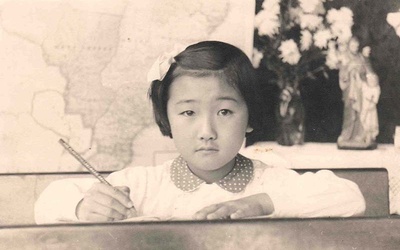
Chapter 16: I Am A “Sampa Kid”
Nov. 2, 2011 • Laura Honda-Hasegawa
I was born in São Paulo Hospital on Frei Caneca Road, in the heart of the city of São Paulo. As a child, my mother often took me for a walk to Ipiranga Park. Local Brazilians, seeing me in a pink dress with a Japanese sunshade, used to refer to me as the “Walking Japanese Doll”. I always enjoyed going to Casa Nakaya, which used to be in the João Mendes Plaza. Back then I used to enjoy riding the …
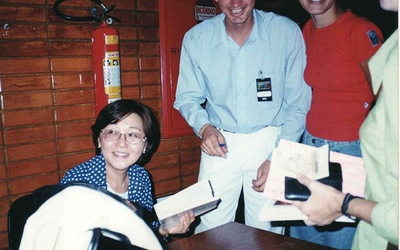
Chapter 15: The Joy of Writing
Oct. 26, 2011 • Laura Honda-Hasegawa
I feel joy from within my heart through writing. Writing about things has given me a feeling of purpose in life, and thanks to that I’ve been able to enjoy my walk through the long journey of life thus far. During my childhood, I would often scribble all over the bottom of drawers. I secretly wrote on the bottom side to keep it from being seen by anyone. I still remember—a long line of what looked like words and pictures, …

Chapter 14: A Variety of Sounds
Oct. 19, 2011 • Laura Honda-Hasegawa
Pochi is a Japanese dogWagging his tail...“Wan, wan”Perry was born in BrazilHe doesn’t understand “Wan, wan”Perry says “Au au”Au au is all he can say Japanese cats say “Nya nya”Roosters say “Kokekokko”It’s different in BrazilThe gato says “Miau miau”The galo says “Co-co-ri-coó” Interesting, isn’t it? “Train train poppo poppoShuppo shuppo shuppoppo”So Japanese children singBut that’s not how it’s done in BrazilIf it’s not “Piu-í piu-í”It’s not a locomotive Tick tock tick tockThe clock is hard at work The heart tooTick …

Chapter 13: Do You Speak Nisei Language?
Oct. 12, 2011 • Laura Honda-Hasegawa
When I was a student, we had an interesting kid in our class. She was Japanese Brazilian, and spoke mostly Japanese at home. Even though 90% of the class was Brazilian, she had no hesitation about using Japanese words. “Anta, estudou para a prova?” (Did anta study for the test?) [Editor’s note: “Anta” is the Japanese word for “you”.] “Eu não entendi direito ano lição.” (I didn’t really understand ano lesson.) [Editor’s note: “ano” is the Japanese word for “that”.] …

Chapter 12: About the Japanese Accent
Oct. 5, 2011 • Laura Honda-Hasegawa
Ever since I was in school, I’ve heard that “Japanese-Brazilians are bad at Portuguese”. Poor writing was a given…it was hard to understand what they said…they had strange pronunciation…bottom line, it sounded like Japanese. Because of that, there were children who unfortunately stopped going to school. Back then, when you walked into a store, it wasn’t uncommon for the clerk to greet you by pretending to speak with a Japanese accent. Even at college, I could quickly sense that kind …

Chapter 11: What’s your name?
Sept. 28, 2011 • Laura Honda-Hasegawa
My name is Laura. Its root language is Latin, and it means “success”. Unfortunately, I don’t have a Japanese name. However, the majority of people in my generation don’t have a Brazilian name. If you only had a Japanese name, you were teased by classmates at school, and even the teachers would make inappropriate comments. So more than a few Japanese Brazilians had a tough time back then. Also, there were students who quit going to school because they were …
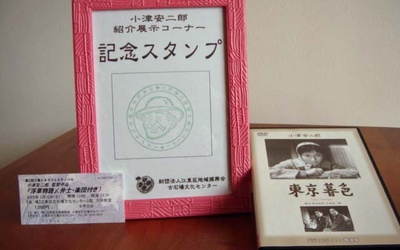
Chapter 10: Dreams of a Movie Girl
Sept. 21, 2011 • Laura Honda-Hasegawa
II was always hanging around my mom. When she was preparing meals, I was always peaking over the table asking, “What’s that?” From my earliest memories, I remember being intrigued by drawings I saw around the kitchen. Even now, I remember them clearly. The ones that were particularly appealing to me were the picture on the sardine cans and the drawing on the packs of oatmeal. It looked to me like the sardine was wearing glasses, so I told my …
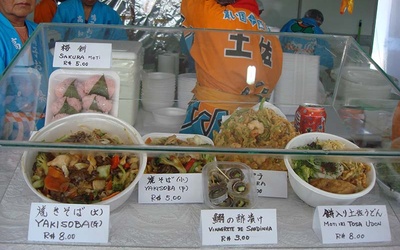
Chapter 9: The World Has Really Changed
Sept. 14, 2011 • Laura Honda-Hasegawa
My mother likes feijoada, while my father likes bacalhoada. As for third-generation me, as a kid I liked natto. This is the first time I’ve said that. I’ve finally said what until now I’ve had to just keep to myself. Why? Because it’s only recently that Brazilians have become familiar with Japanese food culture. When I was in elementary and middle school in the 1960s, Japanese students were ridiculed and told “Japanese people eat raw fish and uncooked vegetables, right?” …
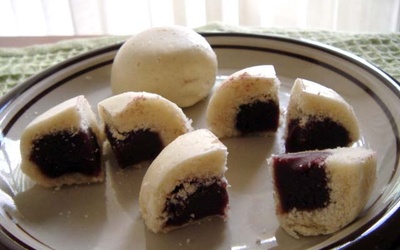
Chapter 8: The Taste of Manju
Sept. 7, 2011 • Laura Honda-Hasegawa
Round, and filled with that oh-so-sweet red bean paste. That’s the Japanese treat, manju . Brazilians know it as “doce de feijon ”. Here’s a story I heard from my mom. It was over 80 years ago. She was living in Shiteio at the time. One day, a customer from out of town visited. It was another Japanese-Brazilian, bearing an unusual gift: manju . The kids hung up the broom upside down behind the door. It was an old spell …

Chapter 7: Men Who Actually Love Dramas
Aug. 31, 2011 • Laura Honda-Hasegawa
“Boys don’t cry.” That’s the mantra for how boys are raised in Brazil. And when they become adults, they’re told “Housework is a woman’s job” and “Only women watch TV dramas,” putting even more pressure on men to shun household chores and dramas. However, that old stereotype has been changing recently, thanks to a certain program. The show is called, Winter Sonata (Fuyu no Sonata). With that as a catalyst, many things have been happening within the Japanese-Brazilian community. While …







